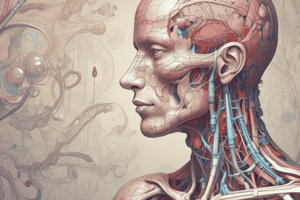Podcast
Questions and Answers
What is the primary focus of human anatomy?
What is the primary focus of human anatomy?
- Investigating the history of human development
- Analyzing chemical reactions in the environment
- Exploring the behavior of living organisms
- Studying the structure and function of biological systems (correct)
Which area of human anatomy is concerned with studying cells?
Which area of human anatomy is concerned with studying cells?
- Physiology
- Histology
- Embryology
- Cellular Anatomy (correct)
What type of cells are found in humans according to the text?
What type of cells are found in humans according to the text?
- Both a & b (correct)
- Virus cells
- Eukaryotic cells
- Prokaryotic cells
Which of the following is NOT a discipline deeply rooted in human anatomy?
Which of the following is NOT a discipline deeply rooted in human anatomy?
Why is human anatomy considered important within the broader context of biology?
Why is human anatomy considered important within the broader context of biology?
What branch of anatomy focuses on the study of molecules like proteins and nucleic acids?
What branch of anatomy focuses on the study of molecules like proteins and nucleic acids?
Which type of tissue is responsible for covering external surfaces in the human body?
Which type of tissue is responsible for covering external surfaces in the human body?
How does understanding human anatomy benefit medical practices?
How does understanding human anatomy benefit medical practices?
In addition to enhancing medical practices, what other benefit does the study of human anatomy provide?
In addition to enhancing medical practices, what other benefit does the study of human anatomy provide?
Which aspect of biology does human anatomy provide insights into by exploring biological systems' structure, function, and development?
Which aspect of biology does human anatomy provide insights into by exploring biological systems' structure, function, and development?
Flashcards are hidden until you start studying
Study Notes
An Insightful Exploration into Human Anatomy as Part of the Fascinating Field of Biology
Human anatomy is a captivating area of study that falls under the vast umbrella of biology, encompassing the structure, function, and development of living organisms. With its roots deeply entrenched in various disciplines, including physiology, histology, embryology, and biology, human anatomy explores the intricate mechanisms that govern our bodies' functionality. It provides essential insights into the world's most complex system—the human body—uncovering intriguing secrets and revealing the interconnectedness of our cells, organs, and systems. This article aims to delve deeper into the fascinating realm of human anatomy, shedding light on its importance within the wider context of biology.
Understanding the Foundations of Human Anatomy
At the heart of human anatomy lies the fundamental concept of studying the structure and function of biological systems. By examining the physical components of living beings, researchers can piece together a comprehensive understanding of the processes that sustain life. Key aspects of human anatomy include:
-
Cellular Anatomy: This branch of anatomy focuses on understanding the building blocks of life—cells. From prokaryotic cells found in bacteria to eukaryotic cells found in animals, including humans, this subfield explores the structure and function of these vital building blocks.
-
Molecular Anatomy: This branch delves into the intricate world of molecules that drive biological processes within cells. From proteins and nucleic acids to carbohydrates and lipids, molecular anatomy offers a microscopic view of life's essential elements.
-
Tissue Anatomy: By studying various tissues in the human body, this branch of anatomy helps us understand how different cell types work together to create functional units called organs. These include connective tissue (such as tendons and ligaments), muscle tissue (like skeletal, cardiac, and smooth muscles), epithelial tissue (covering external surfaces), and nervous tissue (responsible for communication within the body).
The Importance of Human Anatomy in Biology
Human anatomy plays a crucial role in advancing our understanding of biology as it provides essential insights into the complex systems and interactions that govern living organisms. Some key benefits include:
Enhancing Medical Practices
Understanding human anatomy allows medical professionals to diagnose diseases more accurately, develop effective treatments, and improve patient outcomes—ultimately leading to better healthcare services worldwide.
Scientific Research Advancements
By exploring the intricacies of human anatomy, researchers can identify new mechanisms, biological pathways, and potential targets for drug development, furthering our knowledge of life's mysteries.
Evolutionary Insights
Comparative anatomy, a subfield of human anatomy, enables scientists to trace the evolutionary history of species by comparing their physical structures and functions. This helps us understand how organisms have adapted to their environments over time.
Education and Awareness
Studying human anatomy contributes to public education and awareness campaigns, helping people to better understand their bodies and maintain their health through informed choices.
In conclusion, human anatomy is a fascinating and essential aspect of biology that offers invaluable insights into the complex world of living organisms. By exploring the structure, function, and development of biological systems, we can enhance medical practices, drive scientific research advancements, gain evolutionary insights, and promote public awareness of our bodies. This rich field of study promises continued discoveries and a deeper understanding of our place in the natural world.
Studying That Suits You
Use AI to generate personalized quizzes and flashcards to suit your learning preferences.




